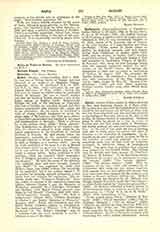

Baillet, ADRIEN, French author, b. 1649 at Neuville en Hez, near Beauvais, France; d. at Paris, 1706. His parents were poor, but the Cordeliers of La Garde, struck by the boy’s piety and alertness of mind, took him into their monastery and then had him admitted to the College of Beauvais, where, at the close of his studies, he became teacher of humanities. Ordained priest in 1676, he served for a time as curate of Lardieu and was then made canon of Beaumont, but neither pastoral nor canonical functions satisfied him. At the end of four years his love of learning took him to Paris, where he secured the place of librarian to the celebrated de Lamoignon. An insatiable reader and a rigid ascetic, he spent his life in the seclusion of study and austerity. In a comparatively short time he had made an analytical catalogue, in thirty-two folios, of Lamoignon’s library. The great mass of erudition thus acquired soon passed into innumerable books. His writings may be divided into three groups: (I) Erudition, (2) History, (3) Religion. To the first group belong: “Jugements des savants sur les principaux ouvrages des auteurs” (1685); “Des auteurs deguises” (1690); “Des enfants celebres” (1688). With the exception of the last, which still attracts by its curiousness, these books are now almost forgotten, both because they are incomplete and because they have been more than replaced by the works of such writers as Brunet, Querard, Barbier, etc. Baillet’s criticisms were not accepted by all. Menage, who thought himself ill-treated, wrote the “Anti-Baillet” to which Baillet replied by “Des satires personnelles” (1682). La Monnoie published a revised edition of all the foregoing books, to which he joined by way of introduction an “Abrege de la vie de M. Baillet” (Paris, 1722; Amsterdam, 1725).
To the second group belong: “Histoire de Hollande” (1690); “Vie de Descartes” (1692); “Vie de Godefroy Hermant”; “Vie de Richer” (1693); “Histoire des demeles du Pape Boniface VIII avec Philippe le Bel” (1718), etc. The author shows too much sympathy for the Jansenist Hermant and the Gallican Richer. His life of Descartes is replete with interesting but rather garbled information. Lelong thought so well of the “History of the Conflict between Boniface VIII and Philippe le Bel” that he edited it (Paris, 1718).
To the third and by far the most important group belong: “Devotion a la Vierge et le culte qui lui est du” (Paris, 1694; Tournai, 1712). The avowed purpose of this book is to clear Mariology from indiscreet devotions, but Baillet clearly overreaches himself by bluntly denying the Immaculate Conception and the Assumption of Mary, and by attacking devotions sanctioned by the Church. The book was put on the “Index Expurgatorius” donec corrigatur in 1694 and 1701. The erudition displayed in “Les vies des saints, composees sur ce qui nous est reste de plus authentique et de plus assure dans leur histoire” (Paris 1701 and 1794) is prodigious, yet the greater part of it (from January to August) was put on the Index in 1707 and 1711. The cause of that condemnation is the hypercritical spirit evinced throughout in the “Vie des Saints”. While aiming at doing away with unauthenticated miracles, Baillet comes very near casting doubt on all miraculous manifestations. Benedict XIV (De festis, II, xvi, 8) calls him a man with an intemperate mind and an ever-ready disposition to impeach even the best attested facts. The Bollandist Stilting (Acta SS., V, 458, 488) says of him, apropos of Bl. Louis Allemand: “I deem it unnecessary to refute a man who, I find, stumbles at nearly every step”. Other Bollandists reproach him for not keeping the rules he had so well laid down in his “Jugements”, and find him frequently at fault, now by excess of criticism, now by excess of credulity. Eusebius is almost the only ancient historian who finds favor with Baillet. All the other writers of hagiology are held by him in suspicion and almost in contempt. That frame of mind could not yield good results. “Some French critics in sacred biography”, says Alban Butler, in the introduction to his “Lives of the Saints”, “have tinctured their works with a false and pernicious leaven, and, under the name of criticism, established scepticism”. That sentence applies in a measure to Baillet. His contemporaries were not mistaken as to the origin of that pernicious leaven. The Bishop of Gap, Berger de Malissoles, in prohibiting the work in his diocese, wrote: “That book on a great many points of dogma and discipline savors the sentiments not only of Jansenism but also of the so-called reformers”.
J. F. SOLLIER

